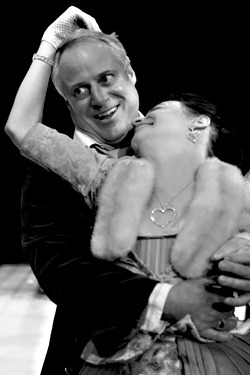The satire is only a backdrop in The School for Scandal, Richard Sheridan’s skewering of an underemployed leisure class with little to talk about except each other. In one of two central plots, an April-December couple battle and reconcile. In the second, a nobleman tries to decide on which of his nephews to bestow his fortune: the hypocrite with a moral platitude always on his lips, or the good-hearted rake. Society’s addiction to gossip complicates these matters, preventing everyone from knowing or telling the truth.
The Seattle Shakespeare Company tackles all this with smoothly humming energy. Ebullient without being frantic, comically pointed without exaggeration, this production allows the actors joyful displays of virtuosity, helping to make Sheridan’s satirical point: Our humane generosity is poisoned when our baser, shallower side takes over.
The cast relishes and savors Sheridan’s rich, rolling language, delicately playing with the phrasing. Director Rod Ceballos puts a whole range of tempos into play, from presto to a time-stopped, blissful adagio. Peter A. Jacobs, virile yet adorably befuddled, is newlywed Sir Peter Teazle; in the role of his wife, one of Betsy Schwartz’s prime assets (she clearly realizes) is her voice, with a slight, seductive breathiness that can float or cut. Charles R. Leggett, as the character who most seems to be Sheridan’s mouthpiece, the blustery Sir Oliver, thoroughly earns our affection. As for his rival nephews, John Bogar’s Joseph, the hypocrite, deliciously suggests Draco Malfoy playing Mr. Collins in the Hogwarts Drama Club’s Pride and Prejudice, while the dissolute Charles, in MJ Sieber’s charismatic turn, becomes a heavily frayed swatch of the finest silk.
The production has the courage to face the script’s unsavory side. In an early scene, a handful of upper-class vipers compete to contrive the cruelest witticisms about an acquaintance. Sacrificing the scene’s potential for easy laughs, the cast plays the meanness to the hilt—to the extent that a kind of cloud falls over the audience; the words are so vicious, no one’s in the mood to chuckle along.
Likewise, when one party guest says of Charles, re his liberal spending, “I am told nobody is better spoken of by the Jews,” a jolt of nervous laughter, and a gasp or two, went through Saturday’s audience. Perhaps there were also sighs of relief that we weren’t going to get a bowdlerized Seattle Nice production of the play. Peter Dylan O’Connor plays Moses—described as “a friendly Jew” and “the honest Israelite” not so much to compliment him as to distinguish him—with commendable adroitness, making him both comic and sympathetic, not a caricature, but not ambiguous, either, with his yarmulke, spectacles, and from-the-old-country accent.
Thanks to the production’s sheer brio, there was no need to do onstage what Ceballos did in his program notes; i.e., point out the parallels between 1777 London and 2007 America. This kind of didacticism would only have gotten in the way. You get the message, even in a staging that stays securely in period. (Actually, there are, just for fun, a few Vegas-y touches to the costumes: leopard-print heels, oversize sunglasses, a pencil mustache. But they’re there merely as design flourishes rather than as markers of Americanism.) Why drag Page Six into it, when you have a cast skilled enough to make the corrosive damage of gossip deeply affecting on its own?







